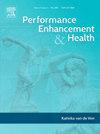Anything but androgens: How image and performance enhancing drug consumers manage body composition and health through off-label use of medicines
IF 2.9
Q2 HOSPITALITY, LEISURE, SPORT & TOURISM
引用次数: 0
Abstract
Introduction
This exploratory study investigates the diverse behavioural practices surrounding the use of non-androgenic image and performance enhancing drugs (IPEDs) among individuals who seek to optimise their body composition. Participants engaged in stacking various substances, often leading to polypharmacy, which complicates the (im)balance between achieving desired physical attributes and maintaining health.
Methods
Semi-structured interviews were conducted with 14 participants, predominantly men (n = 13) and one woman, aged 25–45 years (M = 33.34, SD = 6.27). The interviews explored their experiences with non-androgenic substances such as human growth hormone (HGH), insulin, and metformin, focusing on the strategic integration of these drugs into their routines and their motivations for use. Iterative categorisation was employed to identify key themes, including risk management, perceptions of efficacy, and the role of peer networks in shaping usage practices.
Results
The research highlights how participants employed these non-androgenic substances to manage calorie intake and enhance insulin sensitivity. The cohort reported that this facilitated a more controlled approach to body composition while mitigating the physiological stress associated with high androgen use.
Discussion
The study highlights ethnopharmacology's significance within the IPED community, showing how people navigate drug regimens based on experiential knowledge. While participants noted potential benefits, they also expressed challenges relating to medication access, underscoring the need for improved availability through legitimate channels. This research ultimately advocates for and reinforces the need to recognise people who use IPEDs as knowledgeable agents in health management, informing more effective harm reduction strategies tailored to the complexities of IPED use.
除了雄激素,什么都可以:形象和表现提升药物消费者如何通过标示外用药管理身体成分和健康
本文章由计算机程序翻译,如有差异,请以英文原文为准。
求助全文
约1分钟内获得全文
求助全文
来源期刊

Performance enhancement and health
Social Sciences-Health (social science)
CiteScore
4.70
自引率
0.00%
发文量
27
审稿时长
57 days
 求助内容:
求助内容: 应助结果提醒方式:
应助结果提醒方式:


